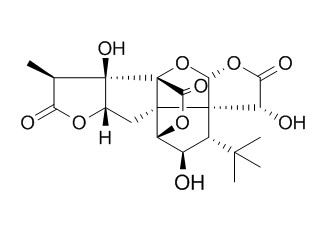Ginkgolide J
Ginkgolide J has neuroprotective activity, it can prevent A beta(1-42) induced inhibition of long-term potentiation in the CA1 region of mouse hippocampal slices, it is also capable of inhibiting cell death of rodent hippocampal neurons caused by A beta(1-42). Ginkgolide J can inhibit platelet aggregation induced by ADP or PAF.
Inquire / Order:
manager@chemfaces.com
Technical Inquiries:
service@chemfaces.com
Tel:
+86-27-84237783
Fax:
+86-27-84254680
Address:
1 Building, No. 83, CheCheng Rd., Wuhan Economic and Technological Development Zone, Wuhan, Hubei 430056, PRC
Providing storage is as stated on the product vial and the vial is kept tightly sealed, the product can be stored for up to
24 months(2-8C).
Wherever possible, you should prepare and use solutions on the same day. However, if you need to make up stock solutions in advance, we recommend that you store the solution as aliquots in tightly sealed vials at -20C. Generally, these will be useable for up to two weeks. Before use, and prior to opening the vial we recommend that you allow your product to equilibrate to room temperature for at least 1 hour.
Need more advice on solubility, usage and handling? Please email to: service@chemfaces.com
The packaging of the product may have turned upside down during transportation, resulting in the natural compounds adhering to the neck or cap of the vial. take the vial out of its packaging and gently shake to let the compounds fall to the bottom of the vial. for liquid products, centrifuge at 200-500 RPM to gather the liquid at the bottom of the vial. try to avoid loss or contamination during handling.
Anticancer Res.2022, 42(9):4403-4410.
Phytother Res.2020, 34(4):788-795.
Nat Prod Sci.2018, 24(3):206
J Biomol Struct Dyn.2022, 5;1-17.
Phytochemistry.2024, 222:114102.
Drug Invention Today2019, 12(6):1303-1306
Food Chem.2019, 275:746-753
Clin Transl Med.2021, 11(5):e392.
Korean J Acupunct2020, 37:104-121
Mol Divers.2022, s11030-022-10586-3.
Related and Featured Products
Neurobiol Aging. 2009 Feb;30(2):257-65. Epub 2007 Jul 20.
Protection against beta-amyloid induced abnormal synaptic function and cell death by Ginkgolide J.[Pubmed:
17640772]
METHODS AND RESULTS:
A new Ginkgo biloba extract P8A (TTL), 70% enriched with terpene trilactones, prevents A beta(1-42) induced inhibition of long-term potentiation in the CA1 region of mouse hippocampal slices. This neuroprotective effect is attributed in large part to Ginkgolide J that completely replicates the effect of the extract. Ginkgolide J is also capable of inhibiting cell death of rodent hippocampal neurons caused by A beta(1-42).
CONCLUSIONS:
This beneficial and multi-faceted mode of action of the ginkgolide makes it a new and promising lead in designing therapies against Alzheimer's disease.
Chem Biol Interact. 1997 Oct 24;106(3):183-90.
Antioxidative activity of ginkgolides against superoxide in an aprotic environment.[Pubmed:
9413545]
METHODS AND RESULTS:
The terpene lactones ginkgolide A, ginkgolide B, ginkgolide C, Ginkgolide J and bilobalide, which are components of a standardized extract (EGb 761) from leaves of Ginkgo biloba, as well as ginkgolide M from roots of G. biloba were studied regarding their reaction against superoxide (O2-) and hydroperoxyl radicals (HO2) in dimethyl sulfoxide as an aprotic solvent. It was found that the ginkgolides B, C, J, M as well as bilobalide react with superoxide and its protonated form as demonstrated by EPR and UV/VIS spectroscopy. The initial reaction rate with these oxygen-derived radicals is in the order of 100 M-1/s and below. Ginkgolide A does not react with superoxide under these conditions.
CONCLUSIONS:
From these findings it can be suggested that the superoxide scavenging effect of the ginkgolides B, C, J, M and bilobalide contributes to the antioxidant properties of G. biloba.
Exp Brain Res. 2007 Jun;179(4):665-71.
Ginkgolides protect primary cortical neurons from potassium cyanide-induced hypoxic injury.[Pubmed:
17225090 ]
In this study, we investigated the effects of ginkgolides (ginkgolide A, ginkgolide B, ginkgolide C and Ginkgolide J), the main constituent of the non-flavone fraction of EGb 761, on hypoxic injury induced by potassium cyanide (KCN) in primary cortical neurons.
METHODS AND RESULTS:
The neurons were pretreated with or without ginkgolides for 24 h before incubation with KCN for 4 h. The results demonstrated that KCN (0.05 mmol/l) significantly decreased cell viability and increased LDH release (P < 0.05 versus the control). The characteristic changes of neuronal morphology induced by KCN were observed. However, pretreatment of neurons with 37.5 microg/ml of ginkgolides (ginkgolides + KCN group) led to a significant increase in cell viability, a decrease in LDH release (P < 0.05 versus the KCN group) and a remarkable improvement in cellular morphology in hypoxic neurons compared with the KCN group.
CONCLUSIONS:
The data suggested that ginkgolides have a significant role to protect the primary cortical neurons from hypoxic injury induced by KCN.
Chinese Journal of Clinicians, 2013,7(24):11569-73.
Effects of the main monomer ingredients of Ginkgo Biloba extract on phosphodiesterase 3 activity of platelet[Pubmed:
15501258]
Ginkgolides A, B, C and J, together with bilobalide, are unique terpenoid components of the Ginkgo biloba tree. Due to similar chemical properties, their separation is quite tedious.
METHODS AND RESULTS:
We have developed an efficient and rapid protocol for separation of individual ginkgolides and bilobalide from G. biloba extracts. The procedure takes advantage of enhanced susceptibility of ginkgolides B and C to benzylation and the ease of separation of these products from ginkgolides A and J which do not react.
CONCLUSIONS:
The protocol is applicable to the previously reported enriched extracts prepared from G. biloba leaves. A single chromatographic step prior to benzylation provides bilobalide and mixture of ginkgolides A, B, C, and J. After benzylation, the individual ginkgolides are separated by chromatography.



